Apps
Auto Added by WPeMatico
Auto Added by WPeMatico
There’s no shortage of TikTok coverage in the news today as the app’s fate in the U.S. hangs in the air.
What the press doesn’t always address is how TikTok gets here — how did a Chinese startup seize the lucrative short-video market in the West before Google and Facebook? What did it do differently from its Chinese predecessors who tried global expansion to little avail? Matthew Brennan’s new book “Attention Factory” set out to answer these questions by tracing ByteDance’s trajectory from an underdog despised by Chinese tech workers and investors to the envy of Silicon Valley and the target of the White House.
Matthew has spent years working closely with China’s tech firms, not only analyzing them but also using their products as a curious local, experiences that informed his meticulously researched and entertaining book. Interwoven with captivating anecdotes of TikTok, rare photos of ByteDance’s original team, incisive analysis and telling infographics, “Attention Factory” is an essential read for those looking to understand how ideas in the American and Chinese internet worlds collided, coincided and converged throughout the 2010s.
TikTok is a rare example of a Chinese internet service that has gained worldwide success. Before expanding overseas, ByteDance had already proven the short-video model in China through Douyin, the homegrown version of TikTok.
The excerpt below follows a high-growth period of Douyin, detailing how it gained around 200 million daily active users within a year: a loyal creator community, viral memes, algorithmic recommendation and aggressive ad spending.
Before long, the Chinese startup would replicate that growth playbook in the rest of the world, tweaking it here and there to make it work.
Hundreds of fashionably dressed young people were arriving at 751 D.PARK, an expanse of industrial plants redeveloped into a hip culture venue in northeast Beijing. They were clad in baseball caps, brightly colored dresses, loose-fitting hip-hop style streetwear and limited-edition sneakers. The site had been transformed into something akin to the stage of the talent competition “American Idol,” spanning two floors filled with strobe lighting, high-volume music and trendy backdrops. This was an exclusive party — three hundred top Douyin creators coming together to celebrate the app’s one-year anniversary.
The online stars, billed as the “new generation of internet celebrities,” weren’t there to just socialize and enjoy themselves. Every influencer was aware of the unspoken competition to derive the best content from that night. They were all fighting to achieve a higher level of superstardom and the medium of battle was short video.
The influencers who knew each other gathered in small groups as their assistants tirelessly captured fifteen-second videos of their carefully crafted skits. Loners roamed around the dance floor, absorbed in finding the ideal lighting for their lip-syncing selfie videos. Lesser-known influencers nervously approached more famous ones, proposing to record a dance together to potentially tap into their peers’ following. Loud hip-hop music kept playing in the background as creators hurried to touch up the videos they had just shot. Once the editing was done, they uploaded their works and anxiously waited for the app’s algorithms to judge who would grab more eyeballs.
Dance teams took to the stage to display their skills. The crowd bopped their heads back and forth as rappers attempted to impress with clever lyrics. Later as the hosts were midway through giving out awards, a wave of noise erupted from the back of the crowd interrupting the proceedings.
It was Yiming. Dressed in a black baseball cap and gray T-shirt and accompanied by Lidong. The audience went wild — the CEO had decided to drop in unannounced! Immediately he was bombarded with requests to take pictures and videos. As those around him whooped and cried out wildly, the entrepreneur simply smiled and kept his hands calmly by his side, an awkward 34-year-old engineer type among the hyper fashionable, mostly teenage hip-hop crowd.

Yiming and Lidong appear at a Douyin promotional event marking the app’s first anniversary in Sept 2017.
He already knew from looking at the data, but this was confirmation in the flesh — Douyin had built a robust community, with powerful momentum and was on the verge of doing something special.
October 1st marks the beginning of “Golden Week,” a seven-day-long official Chinese national holiday. Periods like these are big opportunities for China’s internet industry. People’s behaviors change for a week; many find more time for entertainment and to try new things.
Over October, Douyin’s daily users doubled from seven to 14 million; two months later, they reached 30 million. Over those three months, the 30-day retention rates jumped from eight to over 20%, the average time spent in the app soared from 20 to 40 minutes. It was as if some magic rocket fuel had suddenly been added, boosting every key metric. What had changed?
The answer was Zhu Wenjia. Zhu Wenjia, hired from Baidu in 2015, was widely considered to be one of the top-three best people in the entire company when it came to algorithm technology. He ran one of ByteDance’s most capable engineering teams and had recently been assigned to work on Douyin. The team’s work harnessing the full power of ByteDance’s content recommendation back end led directly to the astounding October results.
The better the metrics, the more resources ByteDance placed behind the app as it now had good retention and was fast-tracked into becoming a strategically important product. Suddenly support was coming in from all over the company — people, money, user traffic, celebrity endorsements, brand collaborations, and most importantly, full integration and optimization of ByteDance’s powerful recommendation engine. Chinese stars with massive fan bases such as Yang Mi, Lu Han, Kris Wu, and Angelababy opened accounts, joining in publicity campaigns, and a nationwide “Douyin Party” event roadshow was planned. Douyin had become the hottest upcoming app in China.
ByteDance ramped up the investment in all three short-video products, including Douyin. People, resources and advertising budget were all raised, leading an industry insider to comment later: “The sudden rise of Douyin wasn’t without good cause. Yiming threw more money at this than anyone and dared to hunt down and grab the best people.”
Commercialization began with the first three brand ad campaigns paid for by Airbnb, Harbin Beer and Chevrolet. Douyin’s advertising business would soon make rapid progress. ByteDance already had hundreds of sales and marketing staff who would shortly be able to add Douyin’s advertisement inventory to their sales targets.
Yiming revealed in a later interview that the company had made it compulsory for everyone on the management team to make their own Douyin videos with goals to gain a certain number of likes or suffer forfeits such as doing push-ups. It wasn’t good enough to just look at charts and data; management needed to understand short videos from a creator’s perspective also. Yiming had watched Douyin videos for a long time but creating his own was “a big step for me,” he admitted.
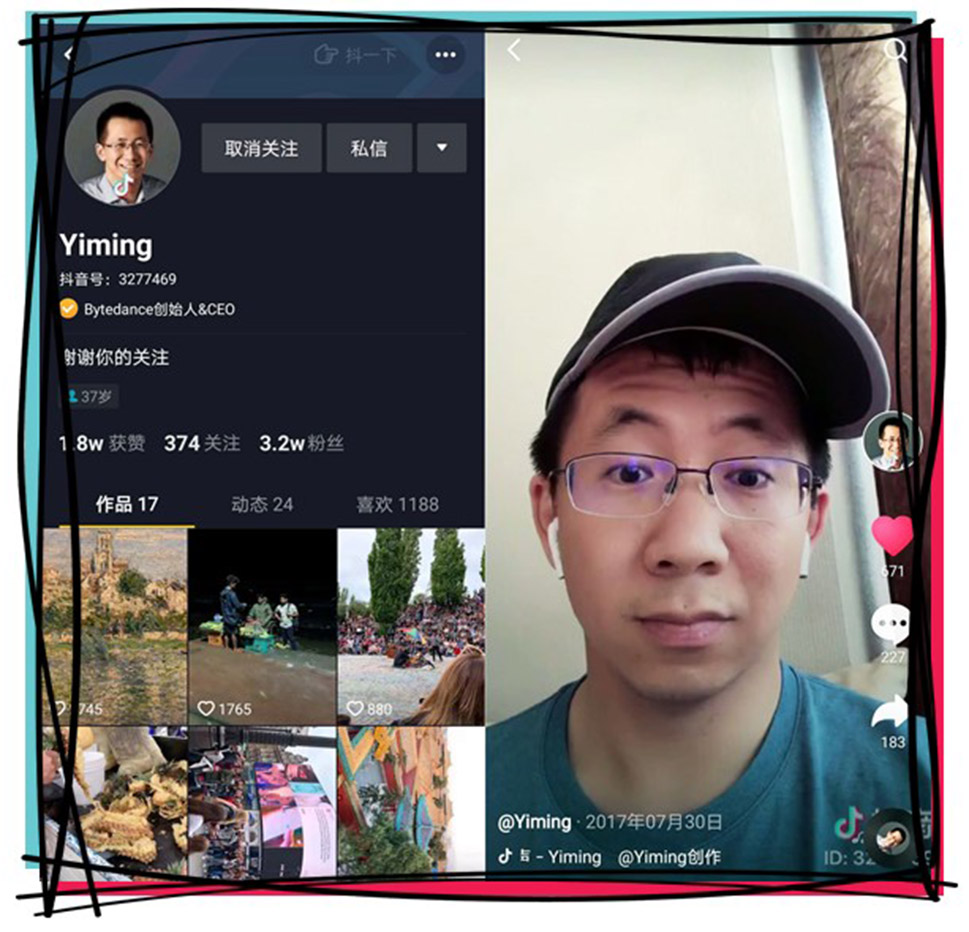
Yiming’s personal Douyin account (3277469). Seventeen videos at the time of writing, including clips from his global travels.
The video opened to a young woman yawning, dressed in pajamas with messy morning hair. Wearing glasses and with no signs of makeup, she casually lip-syncs the line, “Oh well … karma’s a bitch” and throws a silk scarf into the air. Suddenly loud background music explosively begins. In an instant, she transforms into a glamorous fashion model, almost unrecognizable from a second before. A new meme had taken hold of Douyin.
“Karma’s a bitch” was a new version of the original “Don’t judge me” challenge that had propelled Musical.ly to top the U.S. app store three years earlier. The meme was another breakthrough for Douyin; People loved watching the shocking transformations. Compilations of the meme’s videos started popping up online. In particular, the makeup skills of some women left many men in disbelief. “Karma’s a bitch” left an impact on mainstream culture and gained widespread recognition and publicity, even making waves out into English language global media.
Douyin was also increasingly hypercharging the popularity of catchy pop songs with strong hooks. In late 2017, a track known as the “Ci-li-ci-li song” exploded on Douyin. The song’s catchy energy was undeniably infectious. Yet, it was the novel set of dance moves that had become associated with the track’s hook that turned the music into a meme and dramatically amplified its success.
The track had actually been released back in 2013 by Romanian reggae and dancehall artist Matteo, under the name “Panama.” Four years after its debut, the song’s unexpected and explosive spike in popularity led the singer to hastily organize an Asia tour to capitalize on his track’s sudden fame. A YouTube video shows him meeting Chinese fans at the Hangzhou airport who demonstrate their moves to him in the arrivals hall. With the dance having been created entirely in China, the bewildered artist finds himself in the awkward situation of not knowing how to follow the moves to the song for which he is famous.
Perhaps the most reliable indicator of the platform’s increasing influence on society was how the name, Douyin, had started to enter everyday colloquial vernacular, becoming synonymous with short video. The meaning of “Let’s shoot a Douyin!” needed no explanation.
ByteDance knew they now had a winning formula. Retention was good, word of mouth was excellent, a large, vibrant community of video creators had been fostered. The recommendation engine was doing its job of surfacing the best content. Douyin’s fire was already burning bright; now, it was time to pour gasoline on things and spend, spend, spend.
The holiday week of Chinese New Year is another unique annual opportunity for app promotions. Hundreds of millions travel home to be reunited with their families and find themselves with free time to relax. An entertainment app like Douyin was the perfect way to pass the time; word of mouth spread naturally between family members.
To step up its efforts further, Douyin directly gave out money to users by running a Chinese New Year “lucky money” campaign. Users could collect small cash amounts in special videos by tapping on the “red packet” icons — a digital manifestation of cash-filled envelopes people give to each other during the holiday. ByteDance also went all out, spending wildly, buying adverts and promotions across major online channels to acquire users, spending about 4 million yuan a day (over half a million dollars). The combination of all these effects sent Douyin to the top of the Chinese app store charts. Various reports stated Douyin’s daily users jumped from around 40 to 70 million over the February to March period covering Chinese New Year, with some of the top accounts seeing their follower numbers quadruple.
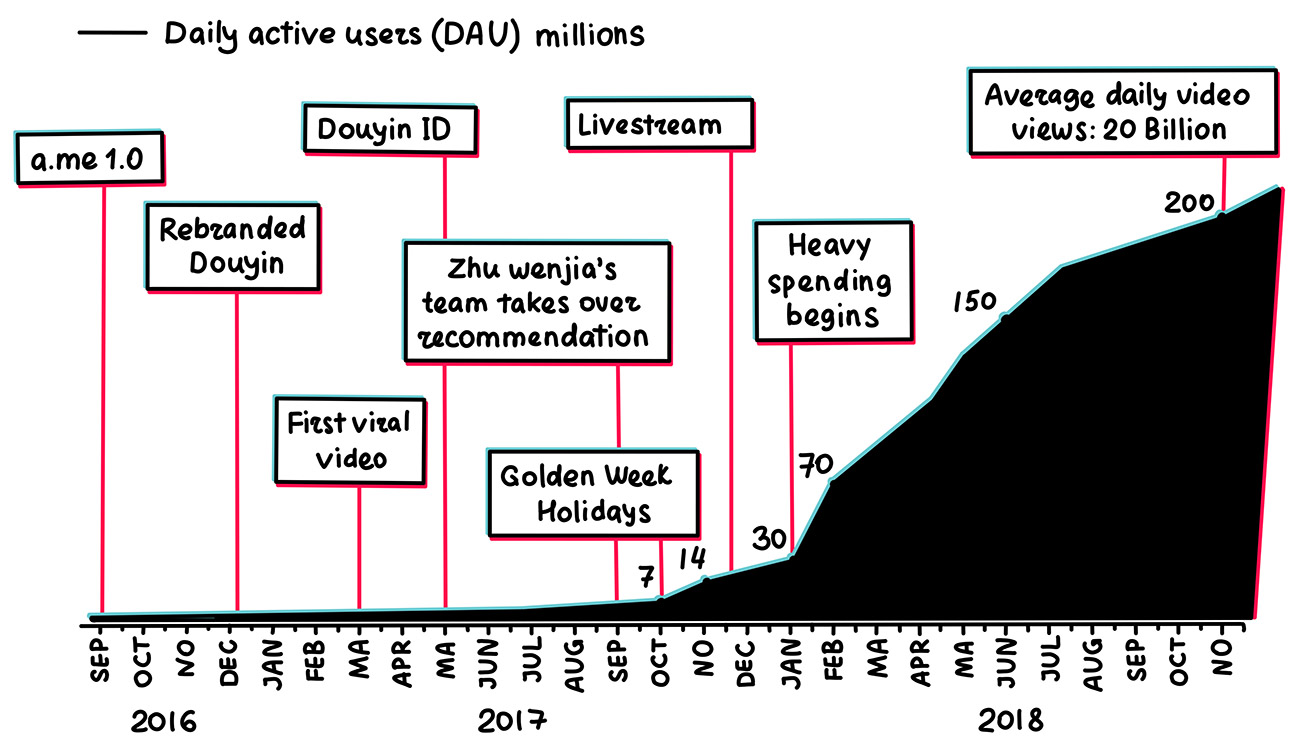
A chart mapping the progress of Douyin, from zero to 200 million daily active users, during the first two years of operation.
This article is an excerpt from “Attention Factory: The Story of TikTok and China’s ByteDance,” which was written by Matthew Brennan and edited by TechCrunch reporter Rita Liao, who wrote the introduction to this post.
Powered by WPeMatico
Epic acquired Houseparty way back in June of last year, following an absolutely massive $1.25 billion raise. It was clear why the Fortnite publisher would be interested in the social video app. After all, Fortnite is one of the most social games around.
Now, after several months of global quarantining, the deal is finally bearing some fruit. Today Epic announced that the title is getting video chat via Houseparty integration. Starting today, the feature is available on a handful of platforms: PC and PlayStation 4 and 5.
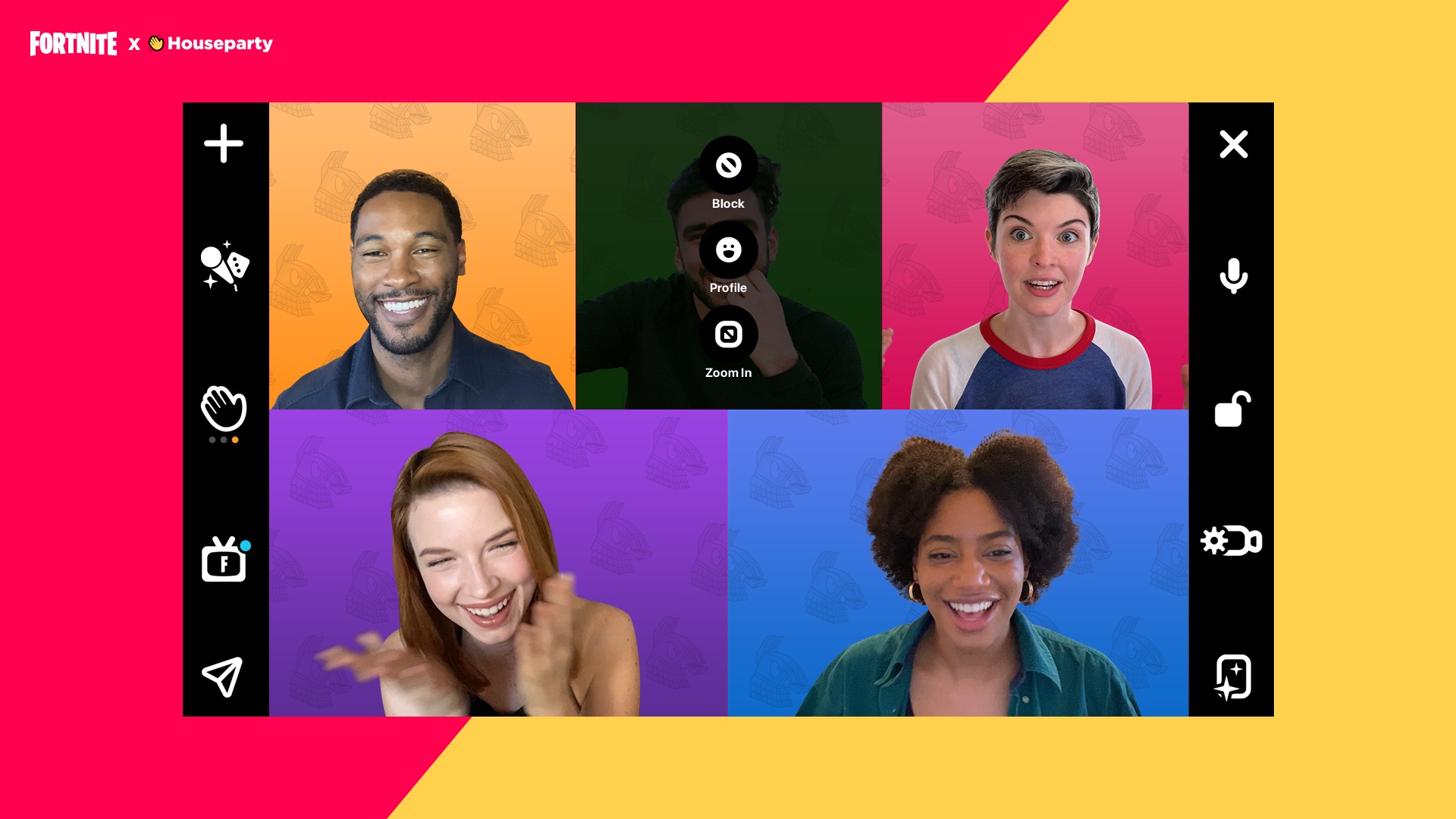
Image Credits: Epic
Users will need to install Houseparty on an Android or iOS device and connect the app with their Epic Games account. From there, the video chat will be integrated into the game. Images are cropped tight on the player’s face and a virtual background is added, à la Zoom. Given the all-ages nature of the game, there are some additional safety features on board, including the ability for parents to toggle off the feature in Fortnite’s settings.
Powered by WPeMatico
French startup Yubo is the biggest social media app you’ve never heard of — unless you’re a teen. With a focus on young people under 25, the company has managed to attract 40 million users. A fraction of them hang out every day in live-streaming rooms, meet new people and spend money for more features.
That’s right, the company isn’t betting on ads. You can pay to unlock items or subscribe to the app. Yubo expects to generate $20 million in revenue this year — that’s twice as much revenue than it generated in 2019.
Yubo recently closed a Series C funding round of $47.5 million. Existing investors Idinvest Partners, Iris Capital, Alven and Sweet Capital are investing once again. Gaia Capital Partners is joining the round as a new investor. Jerry Murdock from Insight Partners isn’t investing in the company but he’s joining the company’s board.
So what is Yubo exactly? It’s a social media app that wants to reverse the current trend of social networks — you can’t follow other users, you can’t like content.
As we’ve seen many, many times in the past, once you introduce a following feature, the ability to like and algorithmic recommendations, your social network becomes a virtual stage. A tiny portion of your user base performs on that stage, the vast majority consumes content. Influencers emerge and monopolize your attention. We’ve seen that trend with Vine, Instagram, YouTube, Twitter, TikTok and even LinkedIn.
Yubo isn’t looking for performers. The company wants to help you meet other people, play games, hang out and create new friendships. In many ways, it feels like a way to hang out with teens that don’t attend your high school.
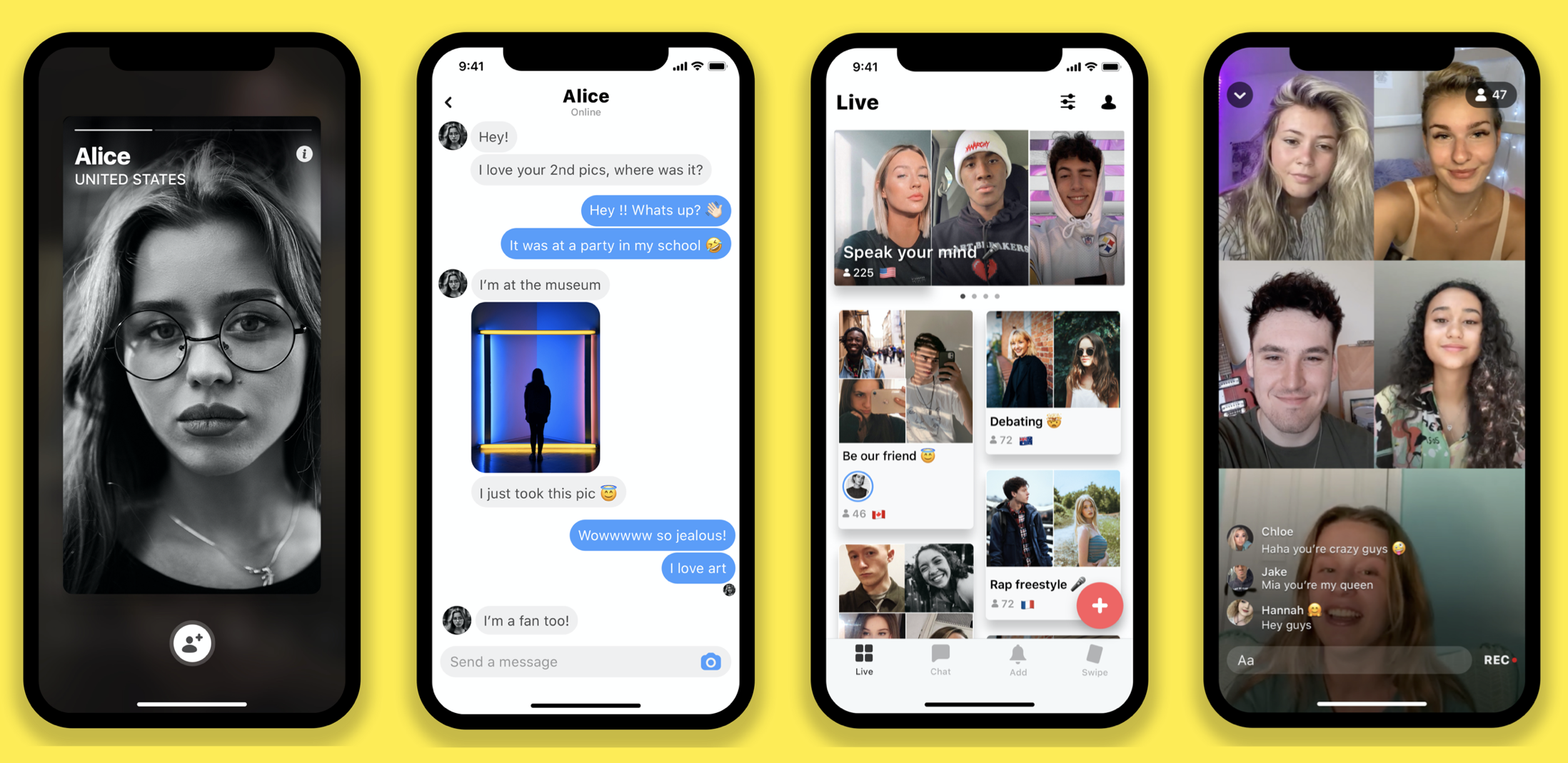
Image Credits: Yubo
When you open the app, you get a list of rooms that you can join. Users can live stream from their phone and chat with other users. You join rooms depending on what you’re looking for — local people, people talking about politics, people playing games, etc.
Once again, the idea isn’t to create giant room with a handful of performers and tens of thousands of viewers. There’s no tipping mechanism so it’s not like Twitch.
“In 95% of rooms, there are only streamers. Rooms have between 5 and 10 people on average,” co-founder and CEO Sacha Lazimi told me.
You can add people as friends and chat with them in the app. In addition to rooms, you can find new friends by swiping left and right on profile pages — an interaction borrowed from Tinder.
“We had 25 million registered users in December. Today, we have more than 40 million users,” Lazimi said. Most users are based in the U.S., the U.K., Canada, Australia and France.
And engagement has been going up as well. The number of hours spent in live rooms is up 400% year-over-year.
With in-app purchases and subscriptions, you get additional features. For instance, you can boost your live stream, promote your profile on the Swipe page or feature your profile at the top of the online section. It’s a way to get more people in your room, receive messages from more users and have more interactions in general.
“We think it’s the future of monetization for social platforms. If you focus on ads, you’re competing with Facebook, TikTok and Snap,” Lazimi said.
With such a young audience, moderation is extremely important. The company has been investing heavily on real-time moderation processes and it tries to enforce strict rules. When you sign up, Yubo checks your identity to put you in the right age group.
“We analyze all content both semantically and visually,” Lazimi said. The company is currently working on alert popups to tell users that they’re doing something inappropriate while it’s happening.
Yubo has in-house safety experts and also works with contractors — it can connect its users with local helplines as well. One-third of the company’s investments are focused on safety. It currently covers 36 languages.
With today’s funding round, Yubo will expand its team. There are currently 30 employees in Paris, London and Jacksonville, which is small when you think about the reach of the app. Yubo will open an office in New York.
On the product front, Yubo is working on recommendation algorithms. The company is also going to build a YouTube integration to consume YouTube content from a room directly. Yubo is also partnering with Snap to integrate Camera Kit. This way, Yubo will be able to build is own AR lenses for its users.
Powered by WPeMatico
In a period of social distancing, making new professional connections feels harder than ever. So Amsterdam-based Cooper is building a network that’s all about making and receiving introductions.
“Everything that happens in the network is based on the foundation of introductions,” CEO Robert Gaal told me. “You should never get an unwanted message, and there’s no such thing as a connection request, because it’s not necessary if you have an introduction.”
The startup is launching internationally today and announcing that it has raised $2 million in seed funding.
Gaal (who co-founded the company with CTO Emiel van Liere) described Cooper as “a private professional network that’s not about how many connections do I have, it’s about bringing the people that you already trust into a circle.”
That’s in contrast with existing professional networking sites, which are most useful as “directories” of online résumés, and usually emphasize the quantity of connections, rather than the quality. (I’ll admit that on LinkedIn, I’m connected to a bunch of people I barely know.)
So Cooper tries to take the opposite approach, limiting users’ connections to people they really know. To do this, it can pull data from a user’s online calendar, and it also provides them with a personal invite code that they can share with their professional contacts.
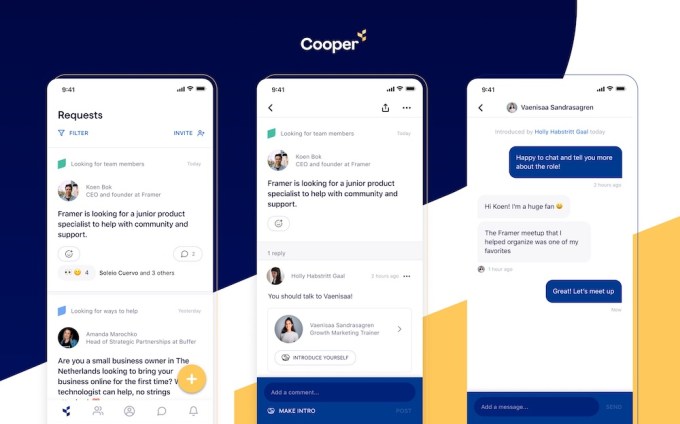
Image Credits: Cooper
Users then post requests or opportunities, which are viewable by their connections and by friends of friends, who can offer to make useful introductions via email or in Cooper itself.
In fact, Gaal said that during the initial beta test, multiple people have successfully used Cooper to find new jobs — sometimes after pandemic-related layoffs, which they’re comfortable sharing with their inner circle but don’t want to broadcast to the world at large.
“There’s more discovery, more trust and you can reinvent other things on top of that — what the résumé is, what mentorship is — if you get trust right first,” he said.
Of course, simply sharing a calendar invite with someone doesn’t really mean you trust them or know them well. Cooper could eventually start looking at other measures that indicate your “connectivity” with someone, like how often you email with them, Gaal said — but the first step is simply recreating the professional circle in which you feel comfortable saying, “Oh, you’re looking for a job? My friend is hiring.”
Yes, those kinds of conversations are already happening offline, but he noted that most of us can only remember “a handful of people” at once. Cooper is making that “marketplace” much more visible and easy to track.
The startup doesn’t sell ads or user data. Instead, Gaal hopes to make money by charging membership fees for features like customizing your profile or promoting your request more broadly.
The startup’s seed funding was led by Comcast Ventures, with participation from LocalGlobe and 468 Capital.
“At a time when the ability to connect is limited, Cooper is building a professional network fostering meaningful and substantive connections,” said Daniel Gulati, founding partner at Forecast Fund and former managing director at Comcast Ventures, in a statement. “We are excited to support the team on their journey ahead.”
Powered by WPeMatico
Many consumers might think Noom or Weight Watchers are industry leaders with their nonstop commercials, but neither is the fastest-growing weight management program.
Over the past year, nutrition app Lifesum has acquired users at nearly twice the rate of both Noom and Weight Watchers, according to statistics from Sensor Tower, the independent market intelligence for the mobile app economy.
Over this past summer, we surpassed Noom on the global scale with 45 million users. More impressively, we accomplished this without any TV buys. That’s right — no multimillion dollar ad campaigns, allowing us to redistribute precious marketing dollars to other growth projects.
Here’s a closer look at the three growth marketing tactics I credit with helping us scale Lifesum over the last 36 months. It’s a strategy any startup can use, regardless of size or budget.
Generations approach products differently. It’s important for startups to understand the different generational approaches of their customers. Startups that spend time thinking and strategizing about where generational trends are going will scale faster.
Here’s a closer look at the three growth marketing tactics I credit with helping us scale Lifesum over the last 36 months. It’s a strategy any startup can use, regardless of size or budget.
Millennials and Generation Z are now the largest consumer market in the world, so you can’t ignore them if you want to scale. With Lifesum these generations have helped our brand surpass the older and well-established competitors. We achieved this by intimately understanding how they view health and fitness.
Gen Z and millennials are all about empowerment. They grew up with Google and Facebook, having information at their fingertips. They are far less likely to be moved by a TV commercial since they desire to discover the world on their own.
In our industry, we’ve learned millennials and Gen Z don’t want a one-size-fits-all weight loss program or to count calories like their parents did 20 years ago. As millennials and Gen Z started embracing keto, intermittent fasting and pescatarian diets, our nutrition team had already created tailored programs to help them stick with it.
As a brand, it’s important to look ahead and anticipate what is coming next. This also applies to marketing your product. If you get in early with emerging marketing platforms, you will save money and potentially reach more early adopters.
Powered by WPeMatico
Activity and fitness tracking platform Strava has raised $110 million in new funding, in a Series F round led by TCV and Sequoia, and including participation by Dragoneer group, Madrone Capital Partners, Jackson Square Ventures and Go4it Capital. The funding will be used to propel the development of new features, and expand the company’s reach to cover even more users.
Already in 2020, Strava has seen significant growth. The company claims that it has added more than 2 million new “athletes” (how Strava refers to its users) per month in 2020. The company positions its activity tracking as focused on the community and networking aspects of the app and service, with features like virtual competitions and community goal-setting as representative of that approach.
Strava has 70 million members, according to the company, with presence in 195 countries globally. The company debuted a new Strava Metro service earlier this year, leveraging the data it collects from its users in an aggregated and anonymized way to provide city planners and transportation managers with valuable data about how people get around their cities and communities — all free for these governments and public agencies to use, once they’re approved for access by Strava.
The company’s uptick in new user adds in 2020 is likely due at least in part to COVID-19, which saw a general increase in the number of people pursuing outdoor activities, including cycling and running, particularly at the beginning of the pandemic when more aggressive lockdown measures were being put in place. As we see a likely return of many of those more aggressive measures due to surges in positive cases globally, gym closures could provoke even more interest in outdoor activity — though winter’s effect on that appetite among users in colder climates will be interesting to watch.
Strava’s app is available free on iOS and Android, with in-app purchases available for premium subscription features.
Powered by WPeMatico
Over the past decade, many startups have tried (and many have failed) to rethink the way we schedule our meetings and calls. But we seem to be in a calendrical renaissance, with incumbents like Google and Outlook getting smarter and smarter and newcomers like Calendly growing significantly.
Undock, an Entrepreneurs Roundtable Accelerator-backed startup, is looking to enter the space.
The startup recently closed a $1.6 million seed round with investors that include Lightship Capital, Bessemer Venture Partners, Lerer Hippeau, Alumni Ventures Group, Active Capital, Arlan Hamilton of Backstage Capital, Sarah Imbach of PayPal/LinkedIn and several other angel investors.
For now, Undock is a Chrome extension that allows users to seamlessly see mutual availability across a group, whether or not all users in the group have Undock, all from within their email. Founder and CEO Nash Ahmed wouldn’t go into too much detail about the technology that allows Undock to accomplish this. But, on the surface, users who don’t yet have Undock can temporarily link their calendar to the individual meeting request to automatically find times that work for everyone in the group. Otherwise, they can see the suggested times of the rest of the group and mark the ones that work for them.
This is just the beginning of the journey for Undock. The company plans to launch a full-featured calendar in Q1 of 2021, that would include collaborative editing right within calendar events, and embedded video conferencing.
According to Ahmed, the most important differentiating features of Undock are that it focuses on mutual availability (not just singular availability) and that it does so right within the email client.
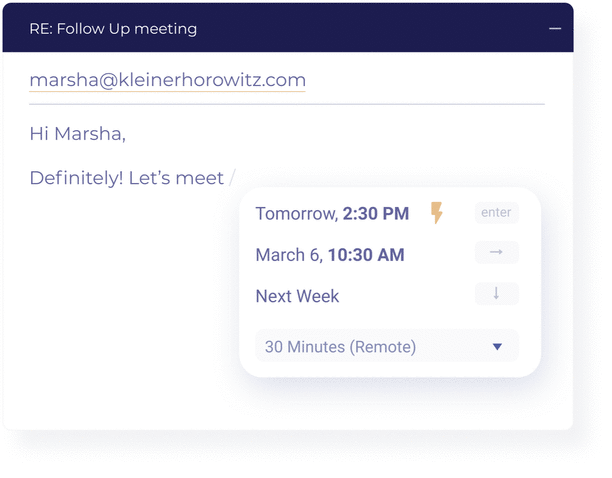
Image Credits: Undock
Scheduling will always be free within Undock, but the full calendar (when it’s released publicly) will have a variety of tiers starting at $10/month per user. Undock will also borrow from the Slack model and charge more for retention of information.
“The greatest challenge is definitely customer education,” said Ahmed, explaining that early on some users were confused by the product’s simplicity. “We messaged it by saying it’s like autocomplete. And early users would get into their email and then ask what to do next, or if they had to go back to Undock or to the Chrome extension. And we’d have to say ‘no, just keep typing.’ ”
The Undock team, which is Black and female-founded, numbers 18 people; 28% of the team is female, 22% are Black and 11% are LGBTQ, and the diversity of the leadership team is even higher.
Powered by WPeMatico
Netflix already borrowed the concept of short-form video “Stories” from social apps like Snapchat and Instagram for its Previews feature back in 2018. Now, the company is looking to the full-screen vertical video feed, popularized by TikTok, for further inspiration. With its latest experiment, Fast Laughs, Netflix is offering a new feed of short-form comedy clips drawn from its full catalog.
The feed includes clips from both originals and licensed programming, Netflix says. It also includes video clips from the existing Netflix social channel, “Netflix Is A Joke,” which today runs clips, longer videos and other social content across YouTube, Twitter, Facebook and Instagram.
Fast Laughs resembles TikTok in the sense that it’s swiped through vertically, offers full-screen videos and places its engagement buttons on the right side. But it’s not trying to become a place to waste time while being entertained.
Like many of Netflix’s experiments, the goal with the Fast Laughs feed is to help users discover something new to watch.
Instead of liking and commenting on videos, as you would in a social video app, the feed is designed to encourage users to add shows to their Netflix watch list for later viewing. In this sense, it’s serving a similar purpose to Netflix’s “Previews” feature, which helps users discover shows by watching clips and trailers from popular and newly released programming.
As users scroll through the new Fast Laughs feed, they’ll encounter a wide range of comedy clips — like a clip from a Kevin Hart stand-up special or a funny bit from “The Office,” for example. The clips will also range in length anywhere from 15 to 45 seconds.
In addition to adding clips to Netflix’s “My List” feature, users can also react to clips with a laughing emoji button, share the clip with friends across social media, or tap a “More” button to see other titles related to the clip you’re viewing.
The feature was first spotted by social media consultant Matt Navarra, based in the U.K. In his app, Fast Laughs appeared in front of the row of Previews, where it was introduced with text that said “New!”
Netflix confirmed to TechCrunch the experiment had been tested with a small number of users earlier this year, but has recently started rolling out to a wider group this month — including users in the U.K., the U.S. and other select markets.
It’s currently available to a subset of Netflix users with adult profiles or other profiles without parental controls on iOS devices only. However, users don’t need to be opted in to experiments nor do they need to be on a beta version of the Netflix app to see the feature. It’s more of a standard A/B test, Netflix says.
And because it’s a test, users may see slightly different versions of the same feature. The product may also evolve over time, in response to user feedback.
Netflix is hardly the first to “borrow” the TikTok format for its own app. Social media platforms, like Instagram and Snapchat, have also launched their own TikTok rivals in recent months.
But Netflix isn’t a direct competitor with TikTok — except to the extent that any mobile app competes for users’ time and attention, as there are only so many hours in a day.
Instead, the new feed is more of an acknowledgment that the TikTok format of a full-screen vertical video feed with quick engagement buttons on the side is becoming a default style of sorts for presenting entertaining content.
“We’re always looking for new ways to improve the Netflix experience,” a Netflix spokesperson said, confirming the experiment. “A lot of our members love comedy so we thought this would be an exciting new way to help them discover new shows and enjoy classic scenes. We experiment with these types of tests in different countries and for different periods of time — and only make them broadly available if people find them useful,” they added.
Powered by WPeMatico
mmhmm, the presentation software developed by Evernote founder Phil Libin, is today coming out of beta. The mmhmm app is now officially available for Mac.
The software allows folks to spice up their video calls with the ability to add different backgrounds, play videos, add images and use filters, among other cool effects. The app has been invite-only since its inception, but today it becomes available to all.
Alongside the launch of the free app, mmhmm is also introducing Premium Tools.
This includes customizable rooms, presenter controls and extra add-ons like laser pointers. Users can get a free seven-day trial of the Premium Tools, and after the trial will have access to these tools for one hour per day. The Premium Tools will cost $99/year or $9.99/month, but free users will still be able to video chat, record, collaborate and use the basic present with a default background and simple presenter mode.
Another important note: mmhmm has decided to make its Premium Tools free to students and educators for one year.
The public launch also brings a handful of new features, including Big Hand Mode (which lets folks in the video call visually react), improvements to the appearance of mmhmm’s virtual green screen and mmhmm Creative Services.
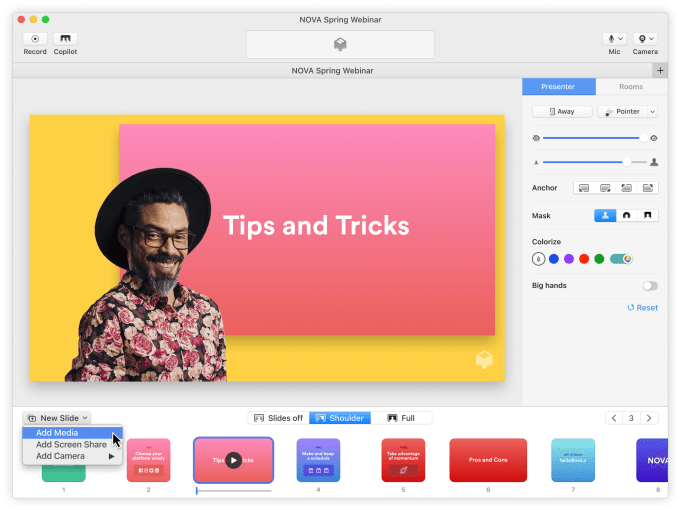
Image Credits: mmhmm
Big Hand Mode is only available on Apple’s new M1-powered Macs.
Creative Services represent another revenue channel for the company, which will now offer white-glove bespoke services to folks running large events or experiences.
For now, mmhmm is only available on MacOS, but the company is working on a Windows beta as we speak.
Powered by WPeMatico
PUBG Mobile plans to return in India in a new avatar, parent company PUBG Corporation said on Thursday. TechCrunch reported last week that the South Korean gaming firm was plotting its return to the world’s second largest internet market two months after its marquee title was banned by the country.
The new game, called PUBG Mobile India, has been specially created for users in India, PUBG Corporation said. It did not share when it plans to release the title.
Additionally, the company — and its parent firm, KRAFTON — said they plan to make an investment worth $100 million in India, one of the largest markets of PUBG Mobile, to cultivate the local video game, esports, entertainment and IT industries ecosystems. It also plans for more than 100 employees in the country.
“Thanks to overwhelming community enthusiasm for PUBG esports in India, the company also plans to make investments by hosting India-exclusive esports events, which will feature the biggest tournaments, the largest prize pools, and the best tournament productions,” it said in a statement.
New Delhi has banned more than 200 apps with links to China — including PUBG Mobile and TikTok — in recent months because of cybersecurity concerns. The ban was enforced as tensions escalated on the nations’ disputed border.
To allay concerns of the Indian government, PUBG Mobile cut ties with Chinese internet giant Tencent — which is its publisher in many markets — in India days after the order. Last week it inked a global deal with Microsoft to move all PUBG Mobile data — as well as data from its other properties — to Azure. Microsoft operates three cloud regions in India.
In a statement today, PUBG Corporation said, “privacy and security of Indian player data being a top priority for PUBG Corporation, the company will conduct regular audits and verifications on the storage systems holding Indian users’ personally identifiable information to reinforce security and ensure that their data is safely managed.”
Prior to the ban in early September, PUBG Mobile had amassed over 50 million monthly active users in India, more than any other mobile game in the country. It helped establish an entire ecosystem of esports organisations and even a cottage industry of streamers that made the most of its spectator sport-friendly gameplay, said Rishi Alwani, a longtime analyst of the Indian gaming market and publisher of news outlet The Mako Reactor.
PUBG Corporation’s move today could also set a precedence for other impacted apps to chart their returns to the country. One thing — and perhaps the most crucial element in all of this — that remains unclear for now is whether the Indian government has approved PUBG Corporation’s move.
Powered by WPeMatico